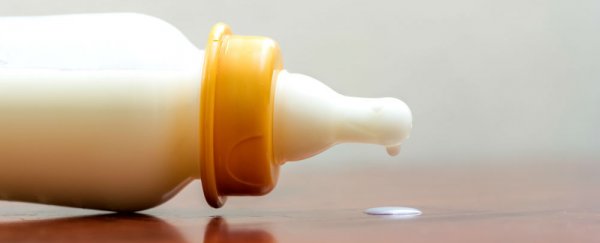While more people appear to be purchasing breast milk over the Internet to feed to their babies, new research suggests the quality of the product isn't always so pure.
As part of a recent experiment, scientists at Nationwide Children's Hospital in Columbus in the US anonymously purchased 102 samples of human breast milk from popular websites, and after running a genetic analysis on each, found that 10 percent contained cow's milk.
And it wasn't just a little bit of cow's milk. In each of the contaminated samples, the level of cow's milk was roughly 10 percent.
In addition to cow's milk being potentially dangerous to children with allergies or intolerance, the findings - which were reported in the journal Pediatrics - raise more questions about the murky online market for human breast milk.
"We racked our brains to think of an explanation for how so much cow's milk could get into a baggie of breast milk," lead author and public health researcher from Nationwide Children's Hospital, Sarah Keim, told Michaeleen Doucleff at NPR.
The team says the concentrations in these contaminated samples were too high to be accidental, and they speculate that sellers are intentionally adding cow milk, possibly as a way to bulk up their sample, which can sell for between US$1 and $3 per 30 millilitres (one ounce).
That means if you're shopping for the high-end breast milk, you might be forking out upwards of $100 for a litre.
"It really is, 'Buyer beware'," Keim told NPR. "When you are purchasing milk from a source you're not familiar with, you can't tell by looking at it if it's safe. It's really a risky activity that we don't recommend."
In 2010, the US Food and Drug Administration warned mothers against feeding their babies breast milk purchased online from unknown donors. They said babies could be exposed to infectious diseases, such as HIV, or toxins from cigarettes, or other illegal or prescription drugs.
Furthermore, the agency advised that poor handling and storage could make the milk unsuitable to drink.
This fact was highlighted by a separate study carried out by Keim and her team in 2013. They bought 60 litres of breast milk online for about $8,000. Almost all the bags arrived above the recommended temperature of minus 20 degrees Celsius, and half were warmer than refrigerator temperatures.
On top of that, they found that three-quarters of the samples had bacterial contamination or contained detectable levels of pathogens, such as salmonella and E. coli.
Nevertheless, buying breast milk online is big business.
A quick Google search turns up 'Only The Breast'. This is a classified site, somewhat like Craigslist or Gumtree, which bills itself as a "community for mom's to buy, sell, and donate natural breast milk."
Sarah Steele, a public health specialist at Queen Mary University of London, told Time that 'Only The Breast' had about 27,000 members in 2014, and gains between 700 and 800 new members each month.
Steele recently co-authored an editorial published in the British Medical Journal, outlining the risks of an unregulated online market for breast milk, saying that in the "absence of warnings", women don't realise that they are putting their children's health at risk.
"I'm a proponent of breast milk," Amy Hair, who directs the neonatal nutrition program at Texas Children's Hospital, and wasn't involved in the study, told NPR. "But if the option is buying breast milk online from an unscreened donor, and not from a reputable milk bank, I would recommend formula."
